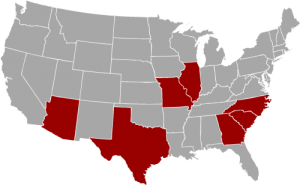Volvo Trucks North America had important news for their fossil-free plans at this year’s American Trucking Associations Management Conference and Exhibition. They announced new customers for their VNR Electric model, giving this regional hauler coast-to-coast coverage while laying out their plans to reduce emissions for their customers and their production facilities.
VTNA’s end goal is to have a 100% fossil-free global fleet by 2050. To reach this target, they’ll need all of their new truck sales to be fossil-free by 2040. They plan on accomplishing this by phasing in hydrogen engines and internal combustion engines that run on alternative fuels while increasing the sales of their electric vehicles. Development is already in motion, with Volvo aiming to make half of their fleet green by the end of the decade.
Fleetmaster Express has ordered 10 Class 8 VNR Electric trucks to transport aluminum for Ball Corp. in the Dallas/Fort Worth area. The company plans to expand its electric fleet to 18 units by the end of the year and eventually go all-electric. Meanwhile, Fresno, California-based Producers Dairy has ordered two trucks for local product deliveries. Volvo says electric truck sales in the state have been high due to emissions requirements and incentives. These businesses join New York-based Manhattan Beer Distributors, who received their first electric trucks earlier this year.
One of the biggest roadblocks when companies consider switching from internal combustion engines to electric, is service availability. In response, VTNA is ramping up electric vehicle training. They say 30 dealers around the U.S. will have mechanics trained to work on VNR Electric trucks by the end of the year.
Volvo is also looking for ways to reduce manufacturing emissions. All VTNA trucks are built at their New River Valley plant in Dublin, VA. This plant is already carbon neutral, courtesy of locally-produced renewable energy, and it’s also landfill-free. At the expo, the company announced their next step to reduce emissions is using electric trucks to transport parts and components to the plant. This starts with Watsontown Trucking Company and Camrett Logistics, using Volvo electric vehicles to transport parts from local warehouses to the plant by the end of the year.


